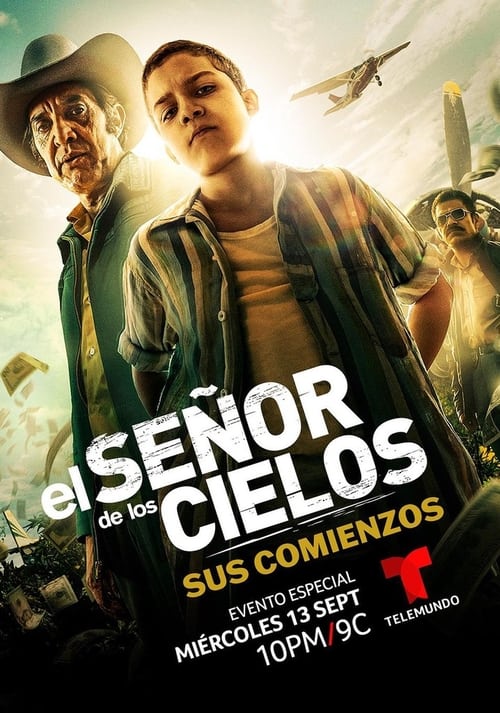
Ask Your Own Question
What is the plot?
The episode begins with a somber atmosphere as the aftermath of the previous conflicts weighs heavily on the characters. El Cid, still grappling with the consequences of his actions, is seen reflecting on his past decisions. He is haunted by the memories of those he has lost and the burden of his responsibilities. The emotional weight of his choices is palpable, and he is determined to seek atonement for the pain he has caused.
As the story unfolds, El Cid receives news that a group of rebels is planning to attack the city. This news ignites a sense of urgency within him. He gathers his loyal followers, including his trusted friend, and discusses strategies to defend the city. The tension among the group is evident, as some members question El Cid's leadership and the morality of their fight. El Cid, however, remains resolute, driven by a desire to protect his people and redeem himself.
In a parallel storyline, the character of Jimena is introduced, who is dealing with her own struggles. She is torn between her loyalty to her family and her growing feelings for El Cid. Jimena's internal conflict is highlighted as she navigates her emotions, ultimately deciding to support El Cid in his quest for redemption. Her decision is fueled by a deep sense of love and a desire to see justice served.
As the rebels prepare for their assault, El Cid and his men fortify the city's defenses. The tension builds as they anticipate the impending attack. The scene is filled with the sounds of clanging metal and the sight of soldiers training, showcasing their determination and readiness to fight. El Cid's leadership shines through as he inspires his men, instilling a sense of hope and courage in the face of adversity.
The rebels launch their attack under the cover of darkness, leading to a fierce battle. The clash of swords and the cries of warriors fill the air as El Cid and his men engage in combat. El Cid fights valiantly, showcasing his skills and bravery. The choreography of the fight scenes is intense, with close-ups of the characters' faces revealing their determination and fear. El Cid's internal struggle is mirrored in the chaos of battle, as he fights not only for his city but also for his own redemption.
During the battle, El Cid encounters a formidable opponent, a leader among the rebels. Their confrontation is intense, filled with personal stakes as they exchange blows. El Cid's motivations are clear; he fights not just for victory but to prove to himself that he can be a hero. The fight escalates, and El Cid ultimately gains the upper hand, defeating his opponent. This victory is bittersweet, as it does not erase the pain of his past.
As the dust settles after the battle, El Cid surveys the aftermath, filled with a mix of relief and sorrow. The cost of the fight is evident, with casualties on both sides. He reflects on the lives lost and the impact of his choices, deepening his resolve to seek atonement. Jimena finds him amidst the ruins, and their emotional reunion highlights the bond they share. She expresses her support for him, reinforcing his commitment to change.
The episode concludes with El Cid making a vow to honor the fallen and to strive for a better future. He stands before his people, promising to protect them and to seek justice for those who have suffered. The weight of his promise hangs in the air, setting the stage for his ongoing journey of redemption and the challenges that lie ahead. The final scene captures El Cid's determined expression, symbolizing his commitment to his path and the hope for a brighter tomorrow.
What is the ending?
In the ending of "Atonement," the episode culminates in a tense confrontation between El Cid and the forces that threaten his family and his honor. El Cid's internal struggle with his past decisions comes to a head as he seeks redemption for his actions. The episode concludes with a sense of unresolved tension, as El Cid faces the consequences of his choices, while the fates of his allies and enemies hang in the balance.
As the episode unfolds, we begin with El Cid grappling with the weight of his past. The air is thick with tension as he reflects on the choices that have led him to this moment. He is haunted by memories of betrayal and loss, which fuel his determination to seek atonement. The camera captures the furrowed lines on his brow, the intensity in his eyes, and the way he clenches his fists, revealing his inner turmoil.
In the next scene, we see El Cid rallying his loyal followers, urging them to stand firm against the encroaching threat. The atmosphere is charged with urgency as they prepare for battle. The clang of swords and the shouts of warriors fill the air, creating a palpable sense of anticipation. El Cid's voice rises above the din, filled with conviction as he inspires his men to fight not just for their lives, but for their honor and the future of their families.
As the battle commences, the screen is filled with chaotic action. El Cid fights valiantly, his sword flashing in the sunlight as he defends his loved ones. Each swing of his weapon is fueled by a mix of desperation and hope, as he seeks to protect those he holds dear. The camera captures the sweat on his brow, the determination etched on his face, and the fierce loyalty of his comrades as they fight alongside him.
In a pivotal moment, El Cid confronts a key antagonist, a figure from his past who embodies the betrayal he seeks to overcome. Their clash is not just physical but deeply personal, as they exchange words that cut deeper than any blade. The emotional stakes are high, and the audience can feel the weight of El Cid's desire for redemption as he fights not only for survival but for the chance to right the wrongs of his past.
As the dust settles from the battle, the aftermath reveals the toll of the conflict. El Cid stands amidst the fallen, his heart heavy with the loss of life. The camera lingers on his face, capturing the mixture of relief and sorrow that washes over him. He has fought bravely, but the cost of victory is steep. His allies, though victorious, bear the scars of battle, both physical and emotional.
In the final moments of the episode, El Cid is left to contemplate the consequences of his actions. He gazes into the distance, the weight of his choices pressing down on him. The fate of his family remains uncertain, and the unresolved tension lingers in the air. The episode closes with a sense of foreboding, as El Cid's journey toward atonement is far from over, leaving viewers eager to see how his path will unfold in the episodes to come.
Is there a post-credit scene?
In "Atonement," the fifth episode of "The Legend of El Cid," there is no post-credit scene. The episode concludes without any additional content after the credits roll, focusing instead on the resolution of the episode's main conflicts and character arcs. The narrative wraps up the themes of redemption and the consequences of past actions, leaving viewers with a sense of closure regarding the events that transpired in the episode.
What internal conflict does El Cid face in episode 5, 'Atonement'?
In episode 5, El Cid grapples with feelings of guilt and responsibility for the consequences of his actions, particularly regarding the fallout from his decisions that have affected his family and his standing in the kingdom. He is torn between his duty as a warrior and his desire to protect those he loves.
How does the relationship between El Cid and his wife, Jimena, evolve in this episode?
In 'Atonement', the relationship between El Cid and Jimena is strained as they confront the repercussions of El Cid's choices. Jimena expresses her frustration and fear for their future, while El Cid seeks her understanding and support, highlighting their emotional distance and the challenges they face as a couple.
What role does the character of King Ferdinand play in the events of this episode?
King Ferdinand plays a pivotal role in 'Atonement' as he navigates the political landscape and the implications of El Cid's actions. His decisions impact the stability of the kingdom and the relationships between the characters, showcasing his authority and the weight of leadership.
How does the theme of loyalty manifest through the character of Ruy in this episode?
Ruy's loyalty is tested in 'Atonement' as he must choose between his allegiance to El Cid and the expectations of his own family and the kingdom. His internal struggle reflects the broader themes of loyalty and betrayal, as he grapples with the consequences of standing by El Cid.
What significant event occurs that forces El Cid to confront his past mistakes?
In this episode, a significant event occurs when El Cid is confronted by a figure from his past, which forces him to reckon with the mistakes he has made and the impact they have had on his loved ones and his honor. This confrontation serves as a catalyst for his journey towards atonement.
Is this family friendly?
In "Atonement," the fifth episode of The Legend of El Cid, there are several elements that may be considered objectionable or upsetting for children or sensitive viewers.
-
Violence and Combat: The episode features scenes of battle and conflict, which include sword fighting and the aftermath of violence. These moments can be intense and may depict injury or death.
-
Emotional Turmoil: Characters experience significant emotional struggles, including themes of guilt, betrayal, and the quest for redemption. These heavy emotional themes may be difficult for younger viewers to process.
-
Mature Themes: The episode explores complex relationships and moral dilemmas, including loyalty and sacrifice, which may be challenging for children to fully understand.
-
Dark Atmosphere: The overall tone of the episode can be somber, with moments that evoke feelings of despair or hopelessness, which might be unsettling for sensitive viewers.
These aspects contribute to a narrative that, while rich in storytelling, may not be suitable for all audiences, particularly younger children.




































